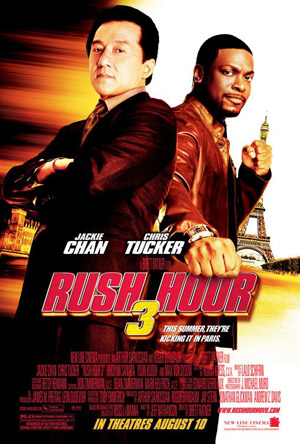 There’s a moment about halfway into Rush Hour 3 that sums it up nicely. Having evaded goons in the Parisian sewer system, Inspector Lee (Jackie Chan) and James Carter (Chris Tucker) arrive at their fancy hotel stinking of shit. In the elevator, reeking and dripping, also rides the French actress Silvie Laguna. (You might remember her failed suicide attempts from Delicatessen.) Her refined urbanite eyebrow barely twitches, and the gag for the scene falls to her dog, which pisses on Tucker’s foot. You see the setup coming a mile away and Rush Hour 3 lets it go with a lifted leg and a tinkle.
There’s a moment about halfway into Rush Hour 3 that sums it up nicely. Having evaded goons in the Parisian sewer system, Inspector Lee (Jackie Chan) and James Carter (Chris Tucker) arrive at their fancy hotel stinking of shit. In the elevator, reeking and dripping, also rides the French actress Silvie Laguna. (You might remember her failed suicide attempts from Delicatessen.) Her refined urbanite eyebrow barely twitches, and the gag for the scene falls to her dog, which pisses on Tucker’s foot. You see the setup coming a mile away and Rush Hour 3 lets it go with a lifted leg and a tinkle.
The audience…howls?
I should add a disclaimer before going forward: I only saw the first two Rush Hour films recently, while prepping to speak to Chris Tucker and cover this film. Already, the events of one film are running into the next; did Lee chase an assassin through the back alleys of LA in the first or third episode? (It was this one.) Point being, Rush Hour 3 does what it says on the tin by combining comedy and action in a formula that is so broadly accessible as to be completely toothless and nearly unmemorable.
As the very concept of this series is to entertain the widest audience possible, it will gently offend one or two sectors, but never to a degree that represents box office poison. The French are the current (and obvious) target but Brett Ratner and returning screenwriter James Nathanson take easy shots at America through Parisian cabdriver George (the talented filmmaker Yvan Attal), who quickly realizes he wants to kill with no reason, just like an American. These culture jabs are just harmless jokes, though, and their docility resigns them to the briefest short-term memory.
Rudimentary plot alert: while speaking to a convocation of the World Crime Court (a fun concept that recalls Buckaroo Banzai) Consul Han is assassinated. Lee gives chase to his killer while Carter comes regrettably to his aid. At the behest of Han’s daughter Soo Jin (Jingchu Zhang, as the adult version of the first film’s kidnap victim) they eventually track the assassin’s Triad connection to Paris, where they try to uncover the secrets behind the upcoming succession of Triad bosses. Max von Sydow and Roman Polanski poke their heads in along the way, but the appearance of each is brief.
This, as expected, is mostly background for gags and action. But the ‘World Crime Court’ got more of a laugh from me than most of the movie. The gags are much the same as before; Carter is loud and unperceptive while Lee knows what’s up and waits for a chance to make his move. But their collision is a soft bounce rather than a crash, and none of the film’s other fish out of water scenarios pan out with more depth.
Part of the weariness of this sequel comes from Chris Tucker’s lack of chops. He’s far out of the game at this point, with no new tools for James Carter. Actors can rise to the occasion when surrounded by more talented peers, and here Tucker has prime conspirators. Chan, Max von Sydow, Roman Polanski and Yvan Attal represent a significant collection of talent. But Tucker flounders, hamstrung further by the limitations of his character.
It’s news to no one that Chan has aged beyond his ability to perform his trademark action, and his insurance premium likely prevents even the moves we saw in Rush Hour. So anonymous stuntmen do the gruntwork; there was one memorable stunt, where a motorcyclist drives into a van’s cargo area then crashes through the windshield and into the car parked in front of it. The film needs another dozen of those bits, and they’re glaringly absent.
I’ll give Ratner credit for coming up with a solid setpiece, however. The film’s showdown on the Eiffel Tower expertly blends locations and sets to come closer than anything else in the series to achieving the sort of death-defying appearance of Chan’s Hong Kong classics. You won’t mistake it for the clock tower fall in Project A, but it’s good enough in this context. This is the moment where Ratner’s unassuming directorial style comes in handy, as he’s able to eke a little extra suspense out of the action while mostly staying out of the way.
I’ll never have an ounce of desire to watch this movie again, but I can’t hate it for it’s middle of the road appeal. But I do resent it’s attitude towards the audience. Rush Hour 3 is so confident the audience will swallow it whole that it doesn’t go a step beyond the obvious. I feel like I should be more up in arms about the film’s quality, but if no one else involved can bother, why should I?
Even while answering the call for broadly appealing movies one doesn’t have to pander so low; Jeremy has already invoked Judd Apatow as an opposite for Ratner and here I’ll do so again. This sequel will undoubtedly rake enough global cash to justify a slate of high paychecks, but I challenge any audience to remember it a month later, and to define their laughter as anything more than a disguised gag reflex.
4 out of 10